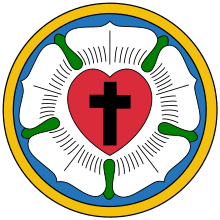Virginia Synod
The Virginia Synod (similar to a diocese) is one of the 65 synods of the Evangelical Lutheran Church in America, consisting of the entire state of Virginia except for several counties and cities in the Metropolitan Washington, D.C. Synod.[2] The Evangelical Lutheran Church in America (ELCA) was formed in 1988 and currently has over 9300 congregations and 3.6 million members in all 50 states.[3] Known as the church of "God's work. Our hands," the ELCA emphasizes the saving grace of God through faith in Jesus Christ, unity among Christians and service in the world. The ELCA's roots are in the writings of the German church reformer, Martin Luther.[4]

| Part of a series on |
| Lutheranism |
|---|
 |
|
|
Bible translators
|
|
Theologians |
|
|
Virginia Synod Evangelical Lutheran Church in America | |
|---|---|
Office of the Bishop, Bittle Hall | |
| Location | |
| Country | United States of America |
| Territory | Virginia excluding Washington, D.C. area |
| Headquarters | Salem, Virginia |
| Statistics | |
| Area | 42,774 sq mi (110,780 km2) |
| Congregations | 153[1] |
| Information | |
| Denomination | Evangelical Lutheran Church in America |
| Established | 1988 (lineage to 1820) |
| Current leadership | |
| Bishop of the Virginia Synod | Rev. Robert F. Humphrey |
| Bishops emeritus | Rev. James F. Mauney, Rev. Richard F. Bansemer, Rev. Virgil (Buck) Moyer, Rev. J. Luther Mauney |
| Website | |
| www | |
The offices of the Bishop are located in the historic Bittle Hall[5] on the campus of Roanoke College in Salem, Virginia. The synod consists of 257 pastors serving 153 organized congregations within 11 conferences. The oldest congregation in Virginia is Hebron Lutheran Church in Madison, Virginia which was founded in 1717. The newest congregation in Virginia is Grace and Glory Lutheran Church in Palmyra, Virginia which was founded in 2001. The synod partners with the Islands District of Papua New Guinea through the ELCA Companion Synod Program,[6] and coordinates sustainable support for people in need of relief from malarial disease, hunger, and disaster.[7] Within the Commonwealth of Virginia, the synod works to find and feed hungry children and advocate for universal breakfast in the classroom following models such as School breakfast club and Oslo breakfast.[8]
Bishops
The Bishop oversees the conferences of the synod and serves as the overall leader, mentor, and shepherd of ecclesiastical life throughout the synod.
- + The Reverend Robert F. Humphrey[9] 2017-Present
- + The Reverend James F. Mauney 1999–2017
- + The Reverend Richard F. Bansemer 1987-1999
- + The Reverend Virgil (Buck) Moyer 1981-1987
- + The Reverend Virgil (Buck) Moyer 1976-1981 (President)
- + The Reverend J. Luther Mauney 1948-1976 (President)
Note: Prior to 1981, Bishops were known as "Presidents" of the synod, though their functions were similar to those of the Bishop today.
Organization
Conferences (lower judicatories) within the Virginia Synod include:[10]
- Northern valley (NV)
- Central valley(CV)
- Page (PG)
- Southern valley (SV)
- Germanna (GR) - 12 congregations all east of the Blue Ridge Mountains from Warrenton to Palmyra and east to Fredericksburg and Stafford. Some of the earliest Lutherans settled in Germanna in 1714. Their first Lutheran Pastor was The Rev. Johann Caspar Stoever, Sr].[11]
- Highlands (HI)
- New river (NR)
- Southern (SO)
- Richmond (RI)
- Tidewater (TD)
- Peninsula (PN)
Each conference is headed by a Dean. Each Dean is a member of the Office of the Bishop and serves as the representative of the Bishop to the conference.[12]
History of the Virginia Synod
The first Lutheran Synod in America was the German Evangelical Lutheran Ministerium of Pennsylvania, organized in St. Michael's church, Philadelphia, Pennsylvania, August 15, 1748, with six ordained ministers and an almost equal number of lay representatives from the different congregations. There were, at that time, only eleven Lutheran ministers in all the colonies. As the number of Lutherans grew, Virginia congregations were formed into the Synod of Maryland and Virginia 1820-1829. The Synod of Virginia was established on August 11, 1829. The sixth convention of the Virginia Synod met in Hebron Lutheran Church in Madison County, Virginia on October 11, 1834. Rev. Thomas W. Miller was elected, president ; and Rev. William Scull, secretary. Three candidates received ordination. It was at this meeting that missionary and educational societies were first organized, and which continued their helpful work for many years. Through these ministries, the people became acquainted with Rev. Miller. They afterward extended him a call which was accepted. His parishioners moved him in wagons from his former pastorate in Botetourt County, Virginia and he began his pastoral work among them about the first of April, 1835.[13]
Camps and retreat centers
The Virginia Synod runs two retreat centers:
- Caroline Furnace Lutheran Camp & Retreat Center—in Fort Valley, Virginia[14]
- Hungry Mother Retreat Center—in Marion, Virginia
See also
References
- http://www.vasynod.org/about/our-congregations/ 150
- "ELCA Synods".
- "ELCA Facts". Archived from the original on 2016-09-25. Retrieved 2016-09-18.
- "ELCA Website News Release".
- "The Council of Independent Colleges: Historic Campus Architecture Project". hcap.artstor.org.
- "Companion Synod Relationships".
- "Team 2017".
- "Virginia Feeds Kids".
- http://www.vasynod.org/about/from-the-bishop/
- http://www.vasynod.org/index.cfm/fa/congregation.find.htm
- Stoever, Johann Casper; Schantz, F. J. F. (Franklin Jakob Fogel) (29 March 1896). "Records of Rev. John Casper Stoever : baptismal and marriage, 1730-1779". Harrisburg, Pa. : Harrisburg Pub. Co. – via Internet Archive.
- "Virginia Synod Conferences".
- "History of the Hebron Lutheran Church, Madison County, Virginia, from 1717 to 1907".
- "Caroline Furnace Lutheran Camp & Retreat Center, Fort Valley VA". Caroline Furnace Lutheran Camp & Retreat Center, Fort Valley VA.